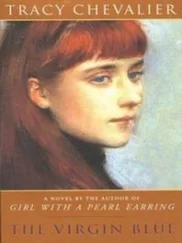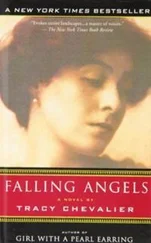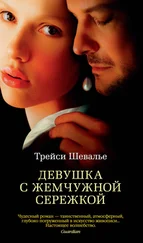“From one of the Golden Pippin trees back home, the one that tasted of pineapple. They’re from the tree you grafted on the Injun trail that you mentioned in your letter. I thought you could plant one out here.”
Robert rolled the hard seeds between his fingers. “I know they’ll mostly turn out to be spitters,” Martha added, “but isn’t one in ten trees usually an eater if you plant them from seed?”
Robert nodded. “You remember.”
“Course I do. You’ve got more than ten seeds there, so if you plant them all you’ll likely get at least one sweet Golden Pippin.”
“Yes.”
Nancy was staring at them. “What are you two talking about?”
“Apples,” Martha said. “Family apples.”

After a while Nancy sent the men away. “Get me my shawl, Billie. Me and Martha are gonna sit here and get to know each other.” She held out her hand and Martha took it.
Billie Lapham glanced at Robert, who shrugged. This would give him a little time to collect the sequoia cones he had come to Calaveras Grove for-though now that he was free for a moment he found he didn’t want to leave his sister, fearful that she was a dream he would suddenly wake from.
He forced himself to head for the stables to get sacks and his shotgun, but he kept turning back around to look at Martha. Seeing the two women together, he understood at last why he’d always been drawn to Nancy Lapham, even in her illness: she and Martha were alike enough that they could be sisters. Nancy’s face was wide where Martha’s was narrow, and her hair was darker to Martha’s fair, but both were delicate and shy and loving.
Each time Robert looked back, Martha laughed and waved. Her laughter was tinkly, tinged with a hint of hysteria, or perhaps merely fatigue, as the nine-month journey caught up with her. Or maybe she worried that, after her coming thousands of miles to find him, Robert might walk into the giant sequoia grove and disappear. After all, he had walked away from her before. He hated to do so now.
He collected his equipment and hurried into the woods. At the nearest giant sequoia, he shot down a few branches and threw the green cones into a sack, not bothering to inspect each for signs of rot or chickaree damage.
Deeper in the woods, though, out of sight of the hotel, he slowed down. In fact he was glad to have the time alone as he tried to put what had just happened into some kind of order. In the space of an hour, his life had changed completely. Seeing Martha was a dream he had never dared to think would become real. All of those letters he’d sent had been a hook thrown out into the wilderness to snag her, or the memory of her; he had not actually expected her to come and find him. Now she had, with a Goodenough baby on the way, and that brought him a stack of new responsibilities and expectations. Since the age of nine Robert had lived his life more or less alone: he could walk away from work, from people, move on, go west. No one had been gripping his arm. When someone did-when Molly did-he had ducked from her. But he could not duck from Martha. Nor did he want to: he was thrilled to feel her holding on to his arm. Only a sliver of him wanted to pry her hand loose and say, “I don’t know how to be a brother anymore.”
While he pondered this sudden change, his collecting instincts took over and he began to gather cones more methodically, even finding three seedlings to bring back. He had just dug up the third one when the stable boy appeared to tell him he was needed back at the hotel.
Though he had only been gone an hour, Martha was in tears on the porch, with Nancy rocking in time beside her, squeezing her hand. Robert set down the sack and the seedlings and took his sister’s other hand. “Martha, Martha, I’m here, I haven’t gone away. I was just collecting seeds. It’s my job. I won’t leave you. I promise.”
“Your brother is a good man,” Nancy added. “Billie and me always said so. Anybody here will tell you that too: Robert Goodenough is a good man.”
Martha nodded and pulled free the hand Nancy held to wipe her eyes. “I know. Course I know.”
But Robert was not sure she did know.

They made a stately procession down the mountain from Calaveras Grove the next day. Robert was used to traveling on his own, just him and the gray, or with William Lobb before his employer’s illness kept him close to San Francisco. And he was not used to traveling with women-one ill, one close to giving birth. They rode together in a wagon bed, Nancy lying down on a mattress, Martha preferring to lean beside her on one of Robert’s sacks of cones. A second wagon carried the Laphams’ possessions: a bed frame, a chest of drawers, a table and chairs, quilts, dishes, trunks of clothes. Wedged among them were the sequoia seedlings and Martha’s bag. Two of Haynes’ men drove the wagons while Robert and Billie Lapham rode behind. Robert had never ridden so slowly. Though it was a reasonable road, they were being careful because of Martha, who winced occasionally, though whether from the jolts from the road or the pain of the baby preparing to come out, he was not sure.
Billie Lapham was full of plans. “It’ll be better being based at Murphys,” he explained. “I can drum up business there, and bring tourists up to Cally Grove, act as their guide, without having to worry about running the place. Leave that to Haynes. I bet there are plenty of miners at Murphys and the surrounding camps-Angels, Columbia, Jamestown-who’d like a day or two out to see the trees. Maybe even the French and the Chinese.”
Robert smiled to himself. Clearly Billie Lapham didn’t know miners if he thought they would willingly take time off from their search for gold to look at some trees, no matter how big they were. But he did not say so. It was heartening to hear of Lapham’s dreams-ever the optimist, even when his business was failing and his wife dying. Also, he was clearly attached to the sequoias, and that love of trees endeared him to Robert. For a moment he considered telling him about the second sequoia grove; it could change the businessman’s fortunes.
Before he could, though, Lapham continued, “This state is made up of people from other places, but they don’t know California at all, except for the little bit where they are. The mining’s dying down and people want to move around, see what there is here before they take their earnings back home. Some of them might even look around for a place to settle. It’s the best time to be in the tourism business. Not just these big trees, but the mountains all around. I hear there are rock formations and waterfalls south of here in Yosemite Valley that’ll knock you over with how big and bold they are. Lots of potential there. Then you got the shoreline with whales and seals, and canyons full of redwoods. Me, though, I’m settin’ my sights on a lake north of here they call Bigler. You seen it? They says it’s the most beautiful lake in the world, huge, with sandy beaches and green bays. Perfect for steamboats and saloons.”
That was never how Robert would envisage a lake, but he was not in the tourist trade. Perhaps Billie Lapham’s enthusiasm could inspire even hard-bitten gold miners to lay down their pans and sluice boxes to look at giant trees and whales and waterfalls, and paddle in an emerald lake. Who was he to say? He was glad he’d just kept his mouth shut about the secret sequoias; otherwise he could have seen them ruined with saloons and bowling alleys. Let Lapham take his tourist attractions to the emerald lake instead. “What about Nancy?” he asked. “Is she going to come with you to this lake?”
Читать дальше
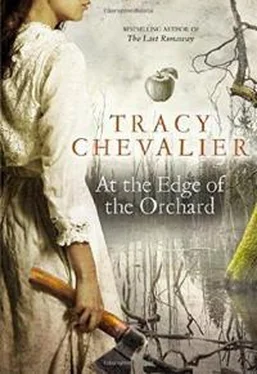



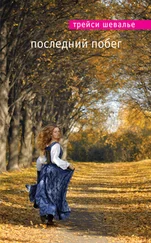

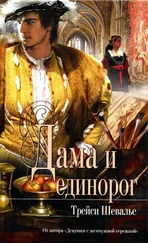

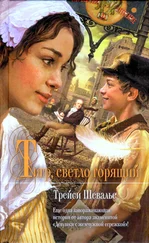
![Трейси Шевалье - Тонкая нить [Литрес]](/books/386177/trejsi-shevale-tonkaya-nit-litres-thumb.webp)
